Question And Answer
Publications
Articles, publications, books, tools and multimedia features from the U.S. Institute of Peace provide the latest news, analysis, research findings, practitioner guides and reports, all related to the conflict zones and issues that are at the center of the Institute’s work to prevent and reduce violent conflict.
Peace Agreements: Guatemala
Acuerdo sobre Cronograma para la Implementación, Cumplimiento y Verificatión, de los Acuerdos in Spanish (12-29-1996) Posted by USIP Library on: November 20, 1998 Source Name: Defense Attaché, Embassy of Guatemala, Washington, D.C. Source URL: www.mdngt.org/paz/acuderdo12.htm Date Downloaded: November 16, 1998 Acuerdo de Paz Firme y Duradera in Spanish (12-29-1996) Posted by USIP Library on: November 20, 1998 ...
Peace Agreements: Guinea-Bissau
Agreement Between the Government of Guinea Bissau and the Self-Proclaimed Military Junta (11-01-1998) Posted by USIP Library on: November 16, 1998 Source Name: Embassy of Guinea-Bissau, Washington, D.C. Date faxed: November 6, 1998
Peace Agreements: Northern Ireland
The Northern Ireland Peace Agreement: The Agreement reached in the multi-party negotiations (04-10-1998) Posted by USIP Library on: July 9, 1998 Source Name: Department of the Taoiseach, Irish Government Source URL: www.irlgov.ie/taoiseach/publication/niagreement/annex.htm Date Downloaded: July 2, 1998
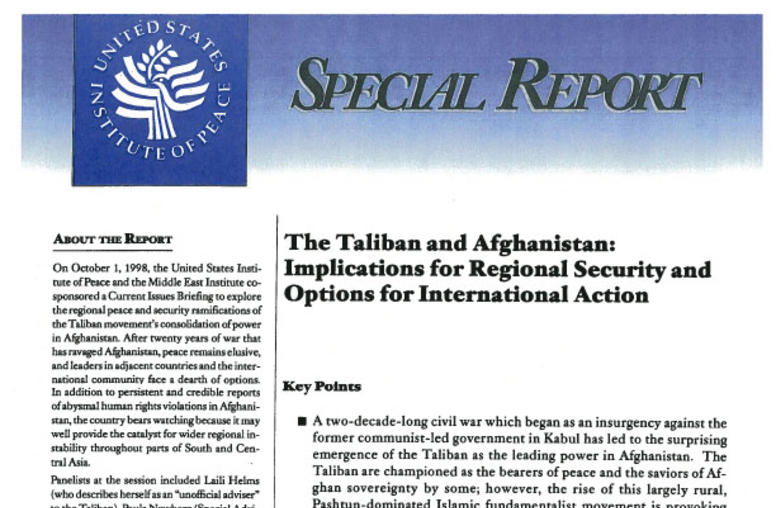
The Taliban and Afghanistan: Implications for Regional Security and Options for International Action
The United States Institute of Peace and the Middle East Institute cosponsored a Current Issues Briefing to explore the regional and security ramifications of the Taliban movement's consolidation of power in Afghanistan. After twenty years of war that has ravaged Afghanistan, peace remains elusive, and leaders in adjacent countries and the international community face a dearth of options. In addition to persistent and credible reports of abysmal human rights violations in Afghanistan, the cou...
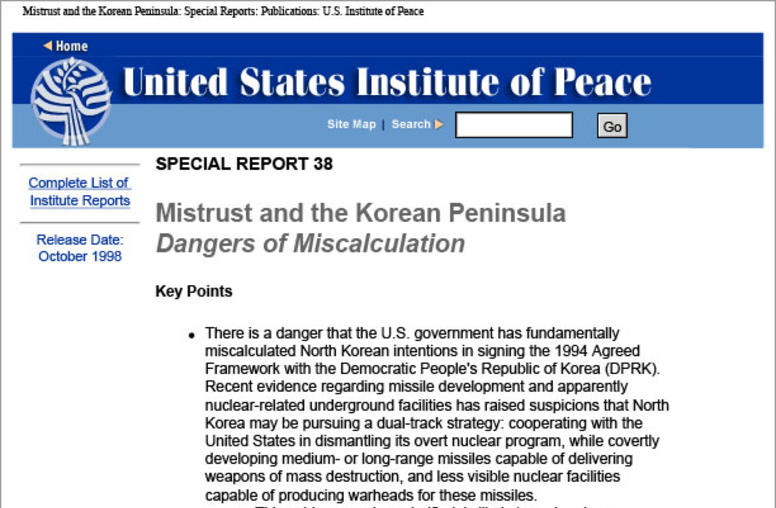
Mistrust and the Korean Peninsula: Dangers of Miscalculation
An unwillingness to challenge North Korea now with a more concerted diplomatic and deterrence policy, lest it precipitate a repeat of the 1994 crisis, risks being confronted later by a qualitatively different North Korean military threat. There is a significant danger of miscalculation: while previous North Korean induced crises have strengthened Pyongyang's negotiating leverage in general and perhaps the Korean People's Army's strong hold on power in particular, there is a serious risk that ...
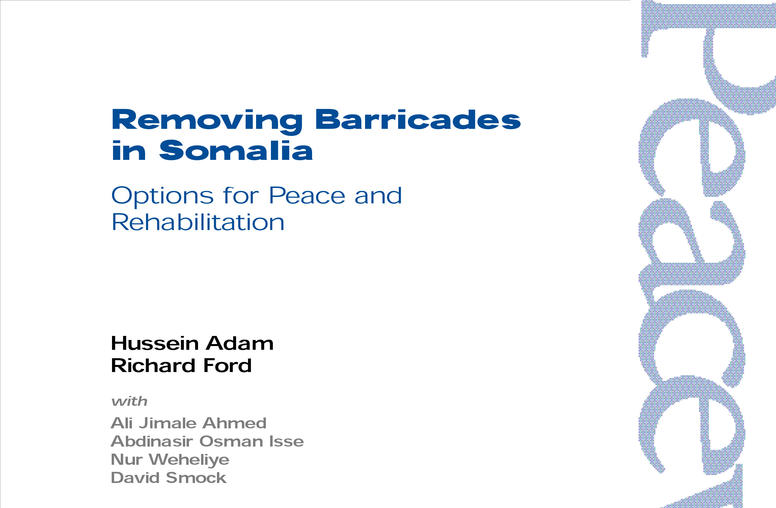
Removing Barricades in Somalia: Options for Peace and Rehabilitation
In summer 1997, a team of four Somali intellectuals and two American Africanists spent three weeks in Somalia on behalf of the United States Institute of Peace. The purpose of the visit was to assess the present circumstances and future prospects for peace and reconciliation in Somalia and to recommend how it might be appropriate for the United States, working with colleagues and institutions in Somalia and neighboring countries as well as within the larger donor community, to play a constru...
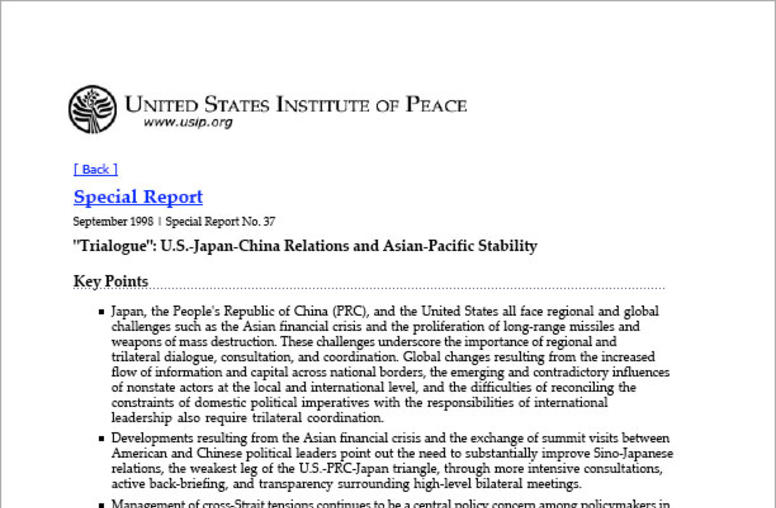
"Trialogue": U.S.-Japan-China Relations and Asian-Pacific Stability
The exchange of summits between the leaders of the People's Republic of China and the United States, the Asian financial crisis, and the decision by India and Pakistan to engage in nuclear testing have redirected the security agenda of the Asia-Pacific region. Such developments underscore the ongoing difficulties inherent in the transition from traditional approaches to security defined by the Cold War to a post-Cold War structure of international relations in the Asia-Pacific.
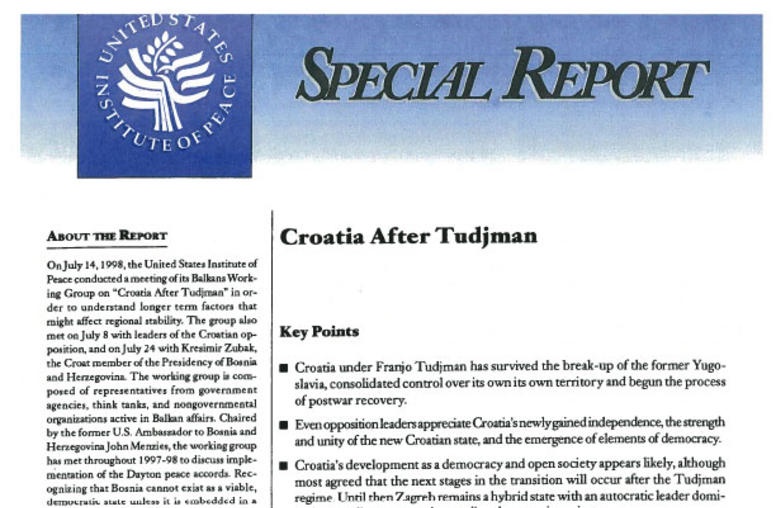
Croatia After Tudjman
Recognizing that Bosnia cannot exist as a viable, democratic state unless it is embedded in a region that is itself stable and democratic, the Institute has begun a Bosnia in the Balkans Initiative to explore the prospects for regional political and economic development. The Balkans Working Group on "Croatia After Tudjman" met in order to understand longer term factors that might affect regional stability. The recent meeting on Croatia is one component of this work, which has included separ...
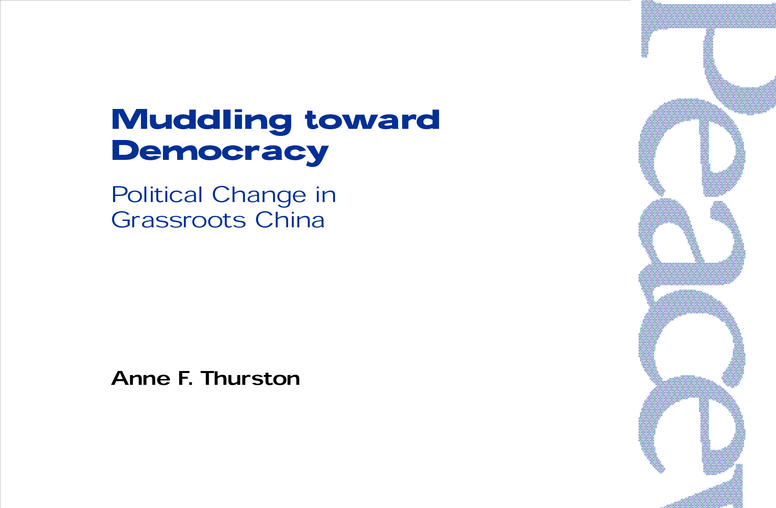
Muddling toward Democracy: Political Change in Grassroots China
Among the most significant political reforms implemented by the Chinese government since 1989 is the introduction of competitive elections into rural villages. This study, based largely on fieldwork conducted between 1995 and 1997, examines China's efforts to bring competitive elections to the country's rural areas and attempts to explain why local democracy has proved more successful in some places than in others.
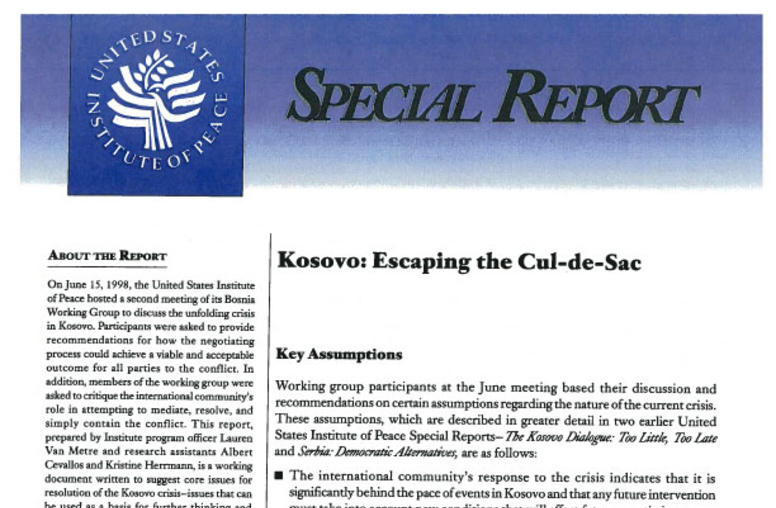
Kosovo: Escaping the Cul-de-Sac
The United States Institute of Peace hosted a second meeting of its Bosnia Working Group to discuss the unfolding crisis in Kosovo. Participants were asked to provide recommendations for how the negotiating process could achieve a viable and acceptable outcome for all parties to the conflict. In addition, members of the working group were asked to critique the international community's role in attempting to mediate, resolve, and simply contain the conflict.